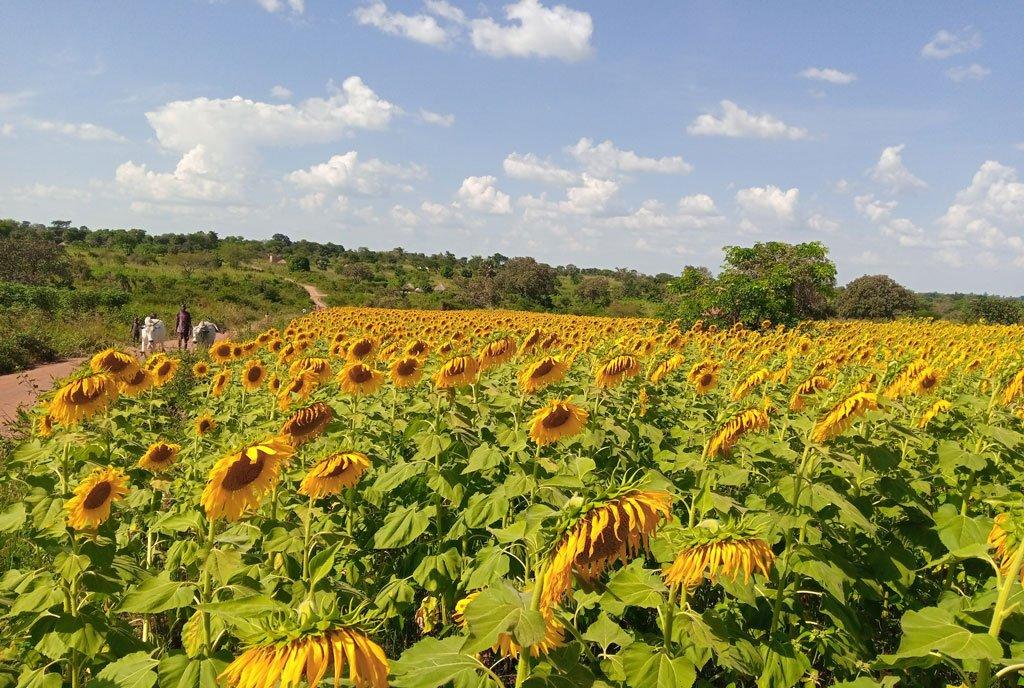Africa-Press – Uganda. Ms Jennifer Arach used to grow beans, maize, groundnuts and finger millet on her five-acre land in Omot Sub-county, Agago District.
Her family is among the182,689 smallholder farmers in the district that have been engaged in crop growing and livestock farming.
However, they failed to get out of poverty and due to population pressure, several farmers encroached on protected ecosystems such as Olupe Opong riverbank where they engaged in farming activities.
For instance, Mr Castro Ongom, a resident of Olupe Central, Geregere Sub- County, says alongside many other farmers, they started growing sugarcane on the banks of Olupe Opong river.
However, this led to degrading of the riverbank. As a result, over the past two decades, Aswa basin, of which Adjumani is part, has lost about 680 kilometre squares (20 percent) of its wetlands, according to CARE International, an organisation that fights poverty and social injustice.
Aswa River basin is home to a dense network of seasonal and permanent marshes, including Adungo riverbank in Kapeleyong and Amuria districts; Ogwete wetland system in Otuke District; Olupe Opong Riverbank, and Karakilet-Lokokokwayi and Kadukuye riverbank in Kitgum District.
To resolve the degradation, wetland systems and riverbanks have been demarcated under the Enhancing Resilience of Communities to Climate Change through Catchment Based Integrated Management of Water and Related Resources in Uganda (EURECCCA) project.
The project, which started in 2017 is funded by Adaptation Fund through Sahara and Sahel Observatory and implemented by the Ministry of Water and Environment.
Under the project, a revolving fund has been introduced to support the 3,472 households formerly encroaching on protected areas and wetlands in the Aswa catchment.
The beneficiaries, including Ms Arach, have been allocated Shs953m under their 161 groups to undertake environmentally friendly income generating activities to enable them diversify their livelihoods.
They are, however, not allowed to set foot in the wetlands and riverbanks, according to a draft memorandum of understanding to be signed with the ministry.
In Agago, 20 out of 32 groups under the Olupe Opong Water and Environment Cooperative have abandoned all the traditional crops and selected sunflower as their major enterprise. The cooperative, which has 706 members, has been allocated Shs182m.
A survey by this newspaper suggests that even farmers who have not joined the groups have started growing sunflower. Mr Tonny Ogwal, the chairperson of Olupe Opong Water and Environment Cooperative, says of their 32 groups, only seven have selected fish farming as their enterprise while five are doing beekeeping. The rest have selected sunflower.
“Many people started growing sunflower two years ago and because of favourable climatic conditions, those who have engaged in growing high value crops such as sunflowers have been realising bumper harvest and we’ve seen people’s lives changing,” Mr Ogwal says.
He says their cooperative is doing contract farming in partnership with Mukwano Group of Companies.
“As I talk now, we are already in talks with the extension manager for Mukwano in Lira City. We have linked up with him and he will soon come to our cooperative,” he says.
Ms Jennifer Arach, the treasurer of Olupe Opong ‘A’ Group, says: “Our group has selected sunflower because it has ready market. We have 23 members, and we are going to identify a land as a group and do collective production.”
The loan is provided to the groups to implement economically viable income generating activities, according to Ms Anna Acan, a social development officer working with EURECCA project.
“The funds provided for inputs are not to be used for any activity other than activities and items stipulated in the approved enterprise budget and work plan,” she says. The beneficiaries working with the Income Generating Activity (IGA) Management Committee of the group shall be responsible for sourcing all inputs, goods and services required for implementation of their IGA within the approved budget and in accordance with EURECCCA guidelines.
The sub-county, district local governments and Ministry of Water and Environment will undertake technical supervision, monitoring and evaluation of the enterprise implementation, Ms Acan explains.
Ms Sarah Tusingwire, the director for agribusiness incubation and value chain development at Mbarara-based Excel Hort Consult Agribusiness Incubator, advises leaders of cooperatives to be more informed.
“When you tune on the radio, make sure you focus on a programme where there is market information so that you are not cheated. The moment you are not informed, there are 100 percent chances of being cheated because they will exploit you knowing that you don’t know what is happening in the other parts of the district and other parts of the country,” she told group leaders at Olupe Primary School, Geregere Sub- County, Agago District, on Saturday.
She also encouraged farmers to embrace beekeeping as a business. In Lira, a litre of honey is trading between Shs25,000 and Shs30,000.
“Honey is very expensive. Get the moral of making money through engaging in beekeeping,” Ms Tusingwire added.
For More News And Analysis About Uganda Follow Africa-Press






